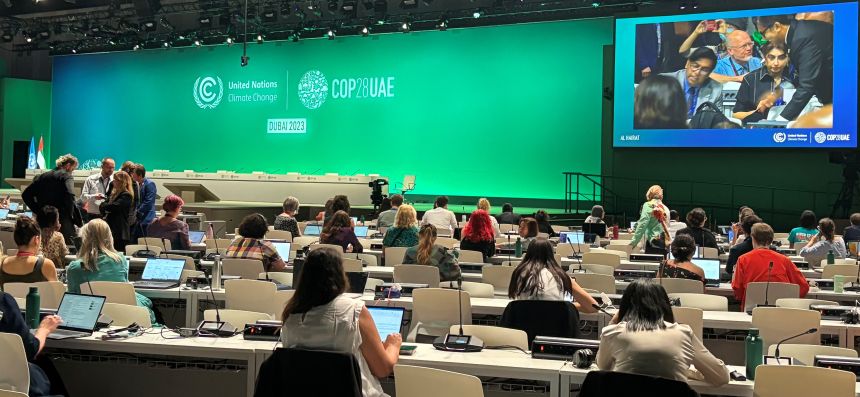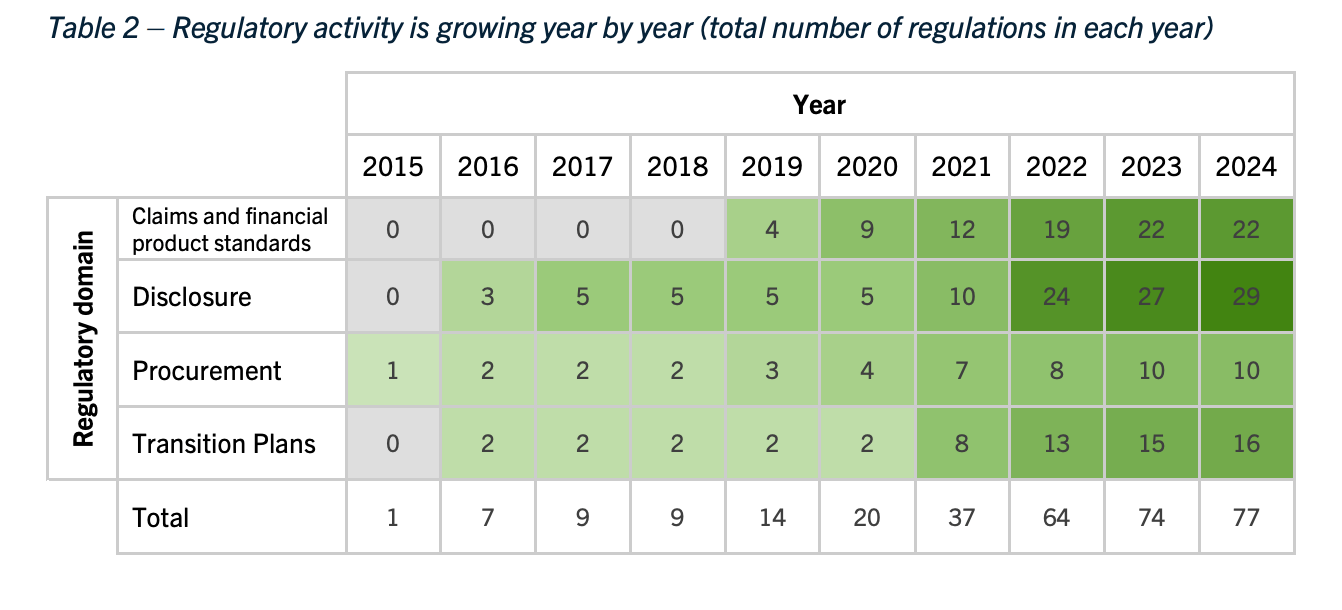
Expert Comment: Turning COP’s promises into progress and the rise of climate regulation
COP28’s outcome is meaningful. For the first time in three decades (since the UN Framework Convention on Climate Change was founded, and the year I was born) oil and gas has been included in an agreed text. The final text includes a pile of compromises that may cause issues down the road, but this moment still represents an historic signal about ‘the beginning of the end of the fossil fuel era’.
By Kaya Axelsson, Net Zero policy engagement fellow.
Amidst carefully caveated celebrations, we can hardly ignore the work we have to do to get there. Having the CEO of a fossil fuel company hold the pen over an international climate agreement only showcases the longstanding relationship between industry and climate politics – one which has historically been far too one-sided.

It is essential, for COP’s promises to mean anything, that governments develop policy and regulatory systems to back climate pledges.
It is essential, for COP’s promises to mean anything, that governments develop policy and regulatory systems to back climate pledges.
But an empirical look at government action across the G20 suggests that a steady move towards corporate climate accountability is, in fact, coming: Oxford Net Zero’s recently published stocktake finds governments around the world are beginning to put up regulatory ‘guardrails’ to protect us from pushing the planet to its limits.
 This is happening in the context of decreasing geopolitical stability, an ongoing fossil-fuelled energy crisis, and the simultaneous acceleration of climate impacts and decarbonisation.
This is happening in the context of decreasing geopolitical stability, an ongoing fossil-fuelled energy crisis, and the simultaneous acceleration of climate impacts and decarbonisation.
Under such conditions, expecting the private sector to deliver voluntarily on climate promises is a bumpy road. The last two years have seen demoralising steps backwards, with companies pulling back on commitments, even as research has become more and more compelling about the economic fundamentals underpinning the green transition.
In response, governments are beginning to take action: in our new report, Lucilla Dias, Adriana Elera and I observe a marked increase in net zero policy and regulation, which will be critical for realizing the new international agreement on a ‘ transition away from fossil fuels...to achieve net zero by 2050’.
Net zero target-setting has been mired with greenwashing charges, and with good reason. Of commitments studied in our report, less than a third were sufficiently backed by a plan that meets minimum internationally agreed criteria.
Since the 2015 Paris Climate Agreement was signed, a flurry of commitments to net zero have been made across the public and private sectors. The latest global net zero stocktake showed the number of large, publicly listed companies with climate targets doubled in two years, with commitments now from more than 50% of companies.
Such pledges are surely promising, but have rightly attracted an obvious question: if that is your destination, what is your plan?
Net zero target-setting has been mired with greenwashing charges, and with good reason. Of commitments studied in our report, less than a third were sufficiently backed by a plan that meets minimum internationally agreed criteria. Last year’s “Integrity Matters” report published by a UN-convened group of experts, pulled no punches in calling out deficiencies underneath the hood of many promises.
While mitigating greenwashing is important, it is even more important to build enabling environments for companies to fulfil their climate commitments by strengthening regulation and policy. Tightening these screws has a dual effect: Laggards will be required to pull their weight, while leaders who have walked the talk will see their investments and efforts rewarded.
There are also many reasons for businesses to call for government action to cut a path through a maze of voluntary Environmental Social and Corporate Governance (ESG) frameworks. Duplicate requirements cost companies time and money, resources that could be going towards developing climate solutions.
It is a critical moment to turn the groundswell of voluntary climate action into clear, fair, and aligned ground rules for the net zero economy
Following the historic pronouncements at COP28, it is a critical moment to turn the groundswell of voluntary climate action into clear, fair, and aligned ground rules for the net zero economy.
Optimistically, our report shows that government efforts to improve climate policy certainty are underway, if not urgently enough. Regulations on disclosure, transition plans, procurement, and claims are all on the rise, with 55% of the global economy showing regulatory activity across at least one of these domains.

Disclosure of climate-related risks is an area where we see some of the most government action, requiring companies to report climate impacts and transition risks and opportunities. The EU set out comprehensive reporting requirements for both listed and unlisted companies in 2022. California has adopted new laws. However, worrying news from the United States’ Securities Exchange Commission, hinting at scaling back climate disclosure regulations, shows these outcomes are far from guaranteed– and reporting is only a first step.
We also find growth across other regulatory domains and jurisdictions: Several governments already require companies to make climate transition plans. Others have even begun cracking down on misleading claims, following a rise in cases brought against companies falsely claiming climate progress. We also see governments rewarding companies for leading on climate through green public procurement. Procurement accounts for 17% of the global GDP according to the World Bank. Given the eye-watering purchasing power of governments around the world, procurement policies could have an inspiring impact.
Our findings show, climate regulation is on its way, but many instruments are yet unused and approaches are varied
Our findings show, climate regulation is on its way, but many instruments are yet unused and approaches are varied. But, while we see action across jurisdictions, perspectives from developing countries are often left out of key decisions with global impacts, made in major economies.
One way to make regulations more interoperable and inclusive is to reference common international standards developed through global consultation processes. Our findings suggest this is happening, with nearly 40% of mapped regulations using voluntary standards as benchmarks. We hope that this will ease some of the challenges of cross-border harmonisation, however, more international coordination and consultation are needed to ensure companies receive fair and aligned climate expectations across domains and jurisdictions.
More international coordination and consultation are needed to ensure companies receive fair and aligned climate expectations across domains and jurisdictions
“To ensure the credibility and accountability of 1.5°C-aligned net zero emissions commitments by non-state actors is underpinned with coherent policies and regulatory certainty,” the UN Secretary General launched a new Policy Taskforce at COP28. This was one announcement that hardly made a headline under the shadow the fossil fuel phase out debate – but often it is the seemingly mundane that matters once the headlines have faded.
The work of this taskforce, and our research on regulation to support it, is meaningful in a context where voluntary alliances have shown vulnerabilities. The rise of anti-ESG sentiments in the US, along with a sequence of threats to the Glasgow Financial Alliance for Net Zero (GFANZ) initiative, and the (perceived) messy interplay of pre-existing laws with new climate initiatives, have demonstrated the sensitivity of voluntary climate collaboration.
Optimistically, our report illustrates that we may be turning a corner, with governments across the world stepping in to back corporate climate action. As they do so, we must ensure that climate regulations are harmonised, rigorous, focused, and tuned into climate justice concerns. If we meet that challenge, it will represent a significant step towards the actualisation of climate commitments, ushering in a new “era of implementation”, and ensuring COP28’s landmark agreement becomes reality, not just words.
With many thanks to friends and colleagues, especially those in Oslo, for support with this piece.
 New analysis of archaeological data reveals how agricultural practices and governance have shaped wealth inequality over the last 10,000 years
New analysis of archaeological data reveals how agricultural practices and governance have shaped wealth inequality over the last 10,000 years
 Cambridge victorious in Women's and Men's Boat Races 2025
Cambridge victorious in Women's and Men's Boat Races 2025
 Expert Comment: Ethical and legal challenges of uterus transplants in Mexico
Expert Comment: Ethical and legal challenges of uterus transplants in Mexico